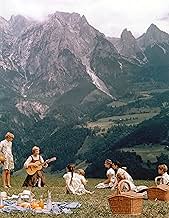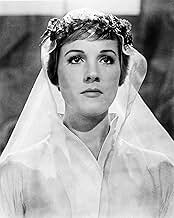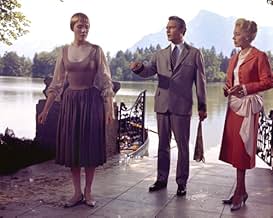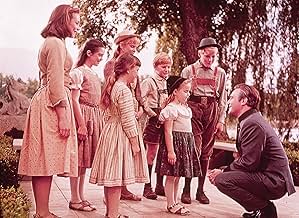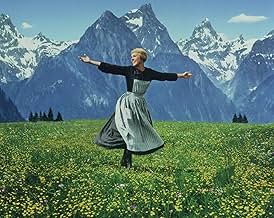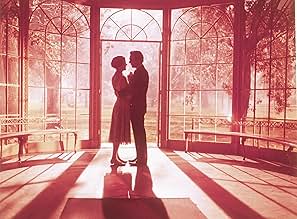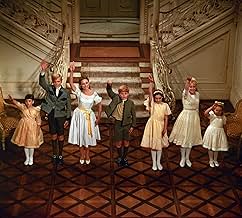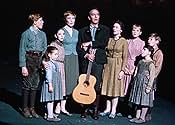Une femme quitte un couvent autrichien pour devenir gouvernante auprès des enfants d'un officier de la marine veuf.Une femme quitte un couvent autrichien pour devenir gouvernante auprès des enfants d'un officier de la marine veuf.Une femme quitte un couvent autrichien pour devenir gouvernante auprès des enfants d'un officier de la marine veuf.
- Réalisation
- Scénario
- Casting principal
- Récompensé par 5 Oscars
- 19 victoires et 13 nominations au total
Heather Menzies-Urich
- Louisa von Trapp
- (as Heather Menzies)
Gilchrist Stuart
- Franz
- (as Gil Stuart)
Résumé
Reviewers say 'The Sound of Music' is cherished for its iconic songs, enchanting performances, and stunning visuals. Themes of love, family, and freedom resonate deeply, though the film's portrayal of Nazism is criticized. Julie Andrews and Christopher Plummer deliver standout performances, while the cinematography is lauded. However, some find the sentimentality, pacing, and character depth lacking. Despite these critiques, its cultural impact and emotional resonance endure.
Avis à la une
Let me confess I'm not a Catholic, I don't have children, I can't stand schmaltz and yet I love The Sound Of Music. I've tried to explain this to myself, let alone to others, without ever finding a satisfactory answer. Yesterday I sat to see it again with a group of kids who hadn't seen it before. They all loved it even the ones who loved Transporters. I asked them afterwards why did they loved it so much and a 12 year old boy's reply was: "It makes you feel alive" Wow, I thought, Wow! Of course, that's what I felt too and a 12 year old found the perfect words to express my feelings. Julie Andrews is a the center of this little miracle. She is Sister Maria and her wishes, thoughts and fears are recognizable automatically, because they are, in many ways, my same wishes, thoughts and fears. Perfect. Thank you.
The "Sound of Music" is set in the mountainous hills and the city of Salzburg, Austria. There is to my eye at least, something about its spacious alpine countryside which dominates and informs the entire production. The air, the light, the music, the styles of dress, the activities--everything is "elevated", with hardly anything being sea-level about it. And the film has a very good "engagement sequence" at the opening, when we learn about the central ethical character and experience her leaving the abbey where she has served along with her, and begin to care about her purposes. The story-line is simple and relatively direct: A young nun, unsuited to the profession, takes a job as a governess to the children of a difficult client--a captain in the Austrian navy who runs the household like a ship's company of sailors, complete with a bosun's whistle and a lineup of the children in matching uniforms. The body of the piece is then concerned with Maria, the governess, subverting the household and winning over the Captain until he gives up his present lady friend, a Baroness; then when Maria, who has been falling in love with him, goes away and comes back, he has to tell her he is in love with her also. They marry, to the children's delight in a great ceremony in a rebuilt replica of Salzburg's cathedral; but a Nazi Parrty official has words with the Captain. The family, against the Captain's former feeling, then enters the Sazlburg musical festival as the Von Trapp Family singers, something he had earlier opposed; and, winning the contest, they flee and are helped at her old abbey by Maria's Prioress and her friends there. The nuns sabotage the Nazis' cars by stealing parts, and Captain Von Trapp leads his family up over the mountain pass to freedom as the film ends. This happy film is filled with tuneful songs ranging from the ultra-simple "Eidelweiss" ballad to "How Do You Solve a Problem Like Maria" , "Do Re Mi", "My Favorite Things", "The Sound of Music", "I Have Confidence", "The Lonely Goatherd", "Something Good", "Sixteen Going on Seventeen" and the voice-challenging "Climb Every Mountain". Robert Wise directed this complex film, which features many sorts of scenes. Everything to me looks clean, bright and, frequently, even Austrian. Ernerst Lehman wrote the screenplay from the Broadway "book" by Howard Lindsay and Russell Crouse that borrowed its fictionalized biography from Maria Augusta Trapp's autobiographical work; Richard Rodgers and Oscar Hammerstein II supplied the music and lyrics. Ted McCord provided lucid cinematography, with the production being designed by Boris Leven. Ruby R. Leavitt and Walter M. Scott did the complex set decorations while famous Dorothy Jeakins created the many vivid costumes. In the large cast, Julie Andrews was a charming Maria, though she was not particularly Austrian. Christopher Plummer had some very good moments as the Captain, Eleanor Parker played the Baroness with great skill and Richard Haydn was the Captain's impresario friend, Max. Ben Wright was the Nazu gauleiter, Peggy Wood the Mother Superior, and among the nuns were Anna Lee, voice-dubbing soprano Marni Nixon, Evadne Baker and Portia Nelson., In the cast also were Daniel Truhitte, Norma Varden, Gilchrist Stuart as Franz the butler, with the children Charmian Carr, Nicholas Hammond, Angela Cartwright, Heather Menzies, Duane Chase, Debbie Turner, and Kym Karath. It is a bit difficult for me as a writer to account for the highly-positive qualities of the film, since in my judgment they exceed the sum of the film's parts. The characters and relationships seem real to the viewer, I suggest, because we discover them along with Maria; her personal dilemmas are interesting, and the use of the Nazi Anschluss as a threat, a problem for the Captain, and a dark cloud hanging over the sunlit lives of the folk in the film works very well. The contrast for instance between the nuns' early disagreement over Maria's character and their helping to thwart the Nazis pursuing the family at the film's climax becomes a highly-symbolic movement; and like the growing love between Maria and the Captain and the children's being won over by their new governess, because the movement again is allowed to develop by slow stages, the satire-level comedy with its touch of drama works powerfully on an audience. There is much to be admired in the simplicity and the beautiful imagery of this film; if it is not an artistic masterpiece, it is frequently absorbing, moving and unaffected all at the same time.
Has Julie Andrews ever appeared on film more beautifully than in this film? Has she ever sung with such richness and gusto as is captured here? As a big fan of hers, I can watch this musical over and over and just sigh.
Wise and his cinematographer have photographed Andrews in a manner that no other director has--even her husband. Watch the scene where Maria watches the Captain sing Edelweiss with the kids. Wise turns her into a gauzy angel. It is a fantastic moment among hundreds that this movie contains.
I am firmly in a camp that says Julie Andrews was completely, utterly, and regrettably robbed when the 1965 Oscars were handed out. She embodied Maria Von Trapp, wholly and with every fiber of her being (just watch the scene in which she races the boys in a segment of "Do-Re-Mi"; she runs at the camera with utter abandon here, no holding back. Or consider the shot at the end of this song, where she places her hand atop her head--it's as if even SHE can't believe she's hitting that note).
The Julie Christie performance that beat Andrews is now all but forgotton. "The Sound of Music," however, lives on and on.
"The Sound of Music" is a bit bittersweet for me, given that audiences tastes would soon turn away from big-budget musicals in general and Julie Andrews specifically. But what a legacy it (and she) have left!
Wise and his cinematographer have photographed Andrews in a manner that no other director has--even her husband. Watch the scene where Maria watches the Captain sing Edelweiss with the kids. Wise turns her into a gauzy angel. It is a fantastic moment among hundreds that this movie contains.
I am firmly in a camp that says Julie Andrews was completely, utterly, and regrettably robbed when the 1965 Oscars were handed out. She embodied Maria Von Trapp, wholly and with every fiber of her being (just watch the scene in which she races the boys in a segment of "Do-Re-Mi"; she runs at the camera with utter abandon here, no holding back. Or consider the shot at the end of this song, where she places her hand atop her head--it's as if even SHE can't believe she's hitting that note).
The Julie Christie performance that beat Andrews is now all but forgotton. "The Sound of Music," however, lives on and on.
"The Sound of Music" is a bit bittersweet for me, given that audiences tastes would soon turn away from big-budget musicals in general and Julie Andrews specifically. But what a legacy it (and she) have left!
The Sound of Music (1965) is an all time classic family musical that has always been one of my favorites. Ever since I was child, I would watch this movie and just love every minute of it. This movie really was destined for greatness from the beginning, anyone at all could have seen that. Between the A list cast, great performances, top notch singing, and the enchanting story.... there's no wonder people still love it to death. Julie Andrews stars as Maria, who is a nun, but not a very good one, and she gets sent to be a governess to the Von Trapp family. The Von Trapp family is a very well to do family in Austria. The father is a former captain and the mother died some time ago. Christopher Plummer plays captain Von Trapp, and he does a great job. Every member of the cast does a great job with their performances, both singing and non. The singing alone in this film is just astounding, every single musical number is just as good, if not better than the previous one. If you do not care for musicals, then I wouldn't really suggest this movie to you. It really is a lot of singing, but it is great singing by talented artists, which is really why it will forever have a place in classic great cinema. 10/10 for The Sound of Music. Enchanting story with lovely entertaining music.
"The Sound of Music" is an impressive musical that stands above other films of the genre because of interesting characters, top-notch direction, and a truly inspired screenplay. Julie Andrews (Oscar-nominated) stars as the young nun who leaves the convent to become the governess to a large family. She is instantly at odds with the children's father (Christopher Plummer), but they soon fall in love and get married. However, evil forces lurk overhead as the Nazis invade their homeland of Austria. Somewhat based on a true story, "The Sound of Music" is one of those rare musicals that works because there is a sense of fear and drama in the film's final act. This makes the film believable and none of the musical numbers take away from the story or the film's direction. 5 stars out of 5.
Oscars Best Picture Winners, Ranked
Oscars Best Picture Winners, Ranked
See the complete list of Oscars Best Picture winners, ranked by IMDb ratings.
Le saviez-vous
- AnecdotesChristopher Plummer accidentally said the word "Captain" to Julie Andrews during the argument scene. Despite the error, producer and director Robert Wise thought it was that amusing, and liked it so much, he kept it in the movie.
- GaffesGeorg von Trapp was an officer in the Austro-Hungarian Imperial Navy in World War I, commanding ships based from ports on the Adriatic coast of Croatia, an Imperial province. In 1918, the Empire was dissolved, leaving Austria a landlocked country, and Von Trapp out of a job in the process. "Austrian Navy" sounds like an oxymoron to viewers unaware of the historical context.
- Crédits fousThe 20th Century Fox logo is played in complete silence.
- Versions alternativesThe 1996 video fits the movie onto one VHS cassette by removing the Intermission screen as well as the Entr'acte.
- ConnexionsFeatured in Film Review: Julie Andrews (1967)
Meilleurs choix
Connectez-vous pour évaluer et suivre la liste de favoris afin de recevoir des recommandations personnalisées
Détails
- Date de sortie
- Pays d’origine
- Sites officiels
- Langues
- Aussi connu sous le nom de
- La novicia rebelde
- Lieux de tournage
- Felsenreitschule, Salzbourg, Autriche(music festival scenes)
- Sociétés de production
- Voir plus de crédits d'entreprise sur IMDbPro
Box-office
- Budget
- 8 200 000 $US (estimé)
- Montant brut aux États-Unis et au Canada
- 159 287 539 $US
- Week-end de sortie aux États-Unis et au Canada
- 413 497 $US
- 9 sept. 2018
- Montant brut mondial
- 159 502 880 $US
- Durée
- 2h 52min(172 min)
- Couleur
- Rapport de forme
- 2.20 : 1
Contribuer à cette page
Suggérer une modification ou ajouter du contenu manquant







